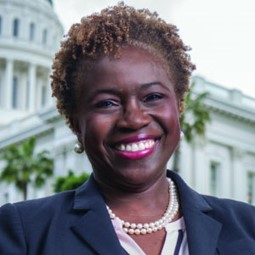Refusing to lose is about never giving up, about successfully navigating uncertainty, and about believing that the future always holds unexpected gifts that the present can’t anticipate. Refusing to lose is why so many who grow up in meager circumstances, often without hope, go on to live fulfilling lives. My personal story is no exception.
I am the daughter of Nigerian immigrants. Like many immigrants, my parents were sent to America by their families to go to college. They met in Chicago where they fell for one another, but unfortunately their love story did not go as planned. Before long, I was the daughter of a single mother who made her way to California to start over. While she never fully achieved her own life goals, she sacrificed to make sure her children had every opportunity. For years, she slept on the couch so my brother and I could have our own bedrooms. She also worked the night shift at a hospital because the extra cash allowed her to send us to Catholic, and eventually private schools.
Her biggest sacrifice came when I was in the 10th grade. During a trip back to Nigeria, her passport and green card were stolen, and without credentials she could not return to the States. But she insisted I stay in the US to get a quality education. Allowing your daughter to live halfway around the world from you is refusing to lose.
By all measures, my circumstances suggested that college might not be in my future. A young Black girl raised by a single mother who had a dalliance with the foster care system is not expected to achieve much. But I went to college and eventually earned a master’s degree and a Ph.D. If that’s not refusing to lose, I don’t know what is.
My years I spent on college and university campuses were not easy. Like many undergraduates of color, there were not many students who looked like me, or even adults who I could go to who would understand my background, circumstances and what it meant for me to walk those hallowed halls. I often didn’t feel comfortable, and certainly didn’t feel entitled, to seek out professors for support or guidance. It wasn’t until I went to graduate school where, for the first time in my life, a professor told me I was smart. She believed in me, and she told me that I should pursue a doctorate. And so I did.
Today, I work as California Governor Gavin Newsom’s senior policy advisor for higher education. It has given me a unique opportunity to help make our higher education system one that truly serves our diverse population. With that in mind last fall I convened, with the Governor’s Council for Postsecondary Education, the Recovery with Equity Task Force. We charged it to cast today’s challenges—especially as they became more evident during the pandemic—as opportunities to help California’s economy recover with a postsecondary ecosystem that is more equitable, resilient and coordinated, especially for Black, Latinx, Indigenous students and adult students.
The task force report identifies 11 recommendations to advance four guiding principles:
- Fostering Inclusive Institutions is focused on inclusive hiring and retention practices, equity-focused curricula, and culturally competent teaching and learning to ensure our institutions work for all learners, especially those left behind.
- Streamlining Pathways to Degrees proposes creating an integrated statewide system for admission and transfer to provide clear, easy-to-navigate pathways to degrees.
- Facilitating Student Transitions considers how to develop high-touch, high-tech guidance and improved academic preparation to make it as easy as possible for students to get to and through college.
- Simplifying Supports for Student Stability is concerned with structuring, packaging and simplifying resources to help students meet basic, digital, and financial aid needs. Students who qualify for multiple forms of aid and public assistance have to navigate an immensely complex, bureaucratic system to receive what they’re entitled to, and as a result, billions of dollars in state and federal aid are left on the table.
Governor Newsom’s 2021-22 budget, proposed in January, reflects these guiding principles. It proposes to invest nearly $300 million in student financial assistance grants, $190 million to support students’ basic needs—food, housing, mental health, and digital equity—and $20 million to bolster student retention rates and enrollment at California Community Colleges. The budget also proposes an expansion of the state’s financial aid program, Cal Grant, by adding an additional 9,000 competitive Cal Grant awards, and by protecting Cal Grant A for students impacted by a change in their living status due to the pandemic. And finally, it calls for a $35 million investment in professional development to help college faculty become more culturally competent instructors.
While not there yet, California is on the path to making a college degree or certificate a reality for more students of color and students experiencing poverty. I’d invite other states to replicate this effort by pulling together their brightest minds to advance equity in higher education and make it more accessible, welcoming and supportive of students like me who, when they were young, were never told they were smart and might second-guess whether college is a place for them.
That’s what it means for higher education to refuse to lose.

